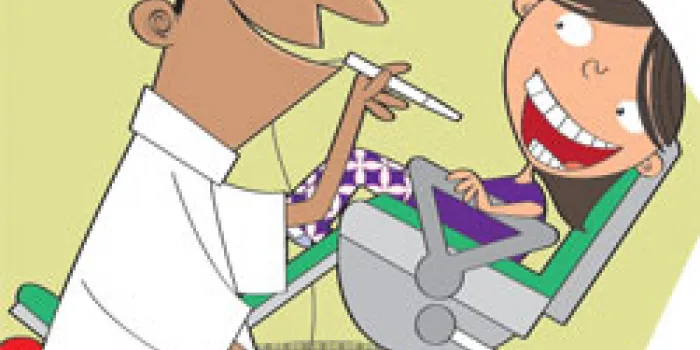Did you know that by the time you grow up, you’ll have 32 teeth in your mouth? You might not realize it now, but taking care of your teeth is one of the most important—and healthy—things you can do for yourself.
Your teeth help you chew foods. They also help you speak clearly. (Try singing your favorite song without using your teeth. It’s harder than it sounds.) They even help you look good when you smile. Once your adult teeth come in, you’ll have them for life! That’s why it’s so important to take good care of your teeth now, so they can stay strong and healthy for a long time.
Like your bones, your teeth are very strong. But sugary foods and drinks, like candy and soda, can make them soft. Then plaque, a clear film, can stick to your teeth, and can attract bacteria and other bad germs. Over time, the bacteria can break down the hard outer layer of your tooth, causing holes called cavities. Cavities can be painful, and you’ll have to see a dentist to fix them. Sometimes, your gums can get infected, too. This is called gingivitis; it makes your gums red and sore.
For kids with bleeding disorders, bleeding from the mouth is quite common. Usually these bleeds are minor, but can look much scarier when the blood gets mixed with your saliva. You might need treatment when a baby tooth falls out or a new permanent tooth comes in, or when you get a cut on your gums or tongue or inside your cheek. If you notice any bleeding in your mouth—especially if it doesn’t seem to stop, or if it stops but starts up again—tell your parents or check with your hemophilia treatment center right away.
Here are a few ways you can keep your teeth healthy:
Brush at least twice a day
Brush in the morning after breakfast and before bedtime. Brush after eating snacks or desserts. Try to brush all of your teeth, even the ones way in the back. Spend at least three minutes brushing each time. Using a timer or playing a recorded song can help you track time. Always use a toothbrush with soft bristles. Swallowing toothpaste might make you sick, so rinse and spit after brushing. Your toothbrush can wear out quickly, so ask your parents for a new one every three months.
Don’t forget to floss your teeth
Sometimes flossing can cause your gums to bleed slightly. Dental floss is a coated string, or tape, that helps you clean between your teeth. It can take out any food or plaque that may have gotten caught in your teeth during the day, which your toothbrush can’t reach.
Make sure you go to the dentist at least twice a year
The dentist may also take X-rays, pictures of the inside of your teeth that show cavities or problems below the surface that they can’t see. Dentists can also show you the best way to brush and floss. If you have any questions about your teeth or gums, don’t be afraid to ask. Dentists know a lot about teeth!
Follow these suggestions and you, your parents and your dentist will be all smiles!
Interested in finding out more about taking care of your teeth and going to the dentist? Then visit www.kidshealth.org, which has tips on teeth just for kids.

